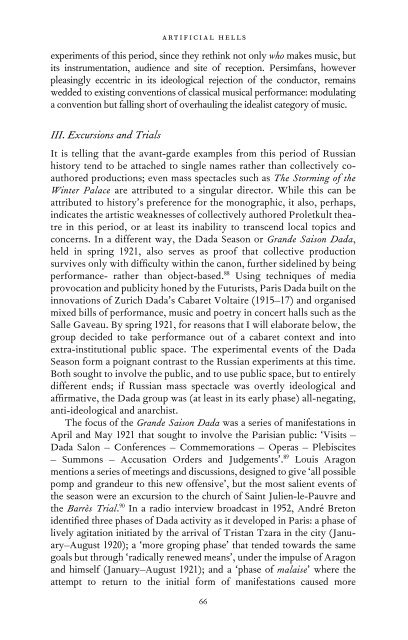Participatory Art and the Politics of Spectatorship - autonomous ...
Participatory Art and the Politics of Spectatorship - autonomous ...
Participatory Art and the Politics of Spectatorship - autonomous ...
You also want an ePaper? Increase the reach of your titles
YUMPU automatically turns print PDFs into web optimized ePapers that Google loves.
artificial hells<br />
experiments <strong>of</strong> this period, since <strong>the</strong>y rethink not only who makes music, but<br />
its instrumentation, audience <strong>and</strong> site <strong>of</strong> reception. Persimfans, however<br />
pleasingly eccentric in its ideological rejection <strong>of</strong> <strong>the</strong> conductor, remains<br />
wedded to existing conventions <strong>of</strong> classical musical performance: modulating<br />
a convention but falling short <strong>of</strong> overhauling <strong>the</strong> idealist category <strong>of</strong> music.<br />
III. Excursions <strong>and</strong> Trials<br />
It is telling that <strong>the</strong> avant- garde examples from this period <strong>of</strong> Russian<br />
history tend to be attached to single names ra<strong>the</strong>r than collectively coauthored<br />
productions; even mass spectacles such as The Storming <strong>of</strong> <strong>the</strong><br />
Winter Palace are attributed to a singular director. While this can be<br />
attributed to history’s preference for <strong>the</strong> monographic, it also, perhaps,<br />
indicates <strong>the</strong> artistic weaknesses <strong>of</strong> collectively authored Proletkult <strong>the</strong>atre<br />
in this period, or at least its inability to transcend local topics <strong>and</strong><br />
concerns. In a different way, <strong>the</strong> Dada Season or Gr<strong>and</strong>e Saison Dada,<br />
held in spring 1921, also serves as pro<strong>of</strong> that collective production<br />
survives only with diffi culty within <strong>the</strong> canon, fur<strong>the</strong>r sidelined by being<br />
performance- ra<strong>the</strong>r than object- based. 88 Using techniques <strong>of</strong> media<br />
provocation <strong>and</strong> publicity honed by <strong>the</strong> Futurists, Paris Dada built on <strong>the</strong><br />
innovations <strong>of</strong> Zurich Dada’s Cabaret Voltaire (1915– 17) <strong>and</strong> organised<br />
mixed bills <strong>of</strong> performance, music <strong>and</strong> poetry in concert halls such as <strong>the</strong><br />
Salle Gaveau. By spring 1921, for reasons that I will elaborate below, <strong>the</strong><br />
group decided to take performance out <strong>of</strong> a cabaret context <strong>and</strong> into<br />
extra- institutional public space. The experimental events <strong>of</strong> <strong>the</strong> Dada<br />
Season form a poignant contrast to <strong>the</strong> Russian experiments at this time.<br />
Both sought to involve <strong>the</strong> public, <strong>and</strong> to use public space, but to entirely<br />
different ends; if Russian mass spectacle was overtly ideological <strong>and</strong><br />
affi rmative, <strong>the</strong> Dada group was (at least in its early phase) all- negating,<br />
anti- ideological <strong>and</strong> anarchist.<br />
The focus <strong>of</strong> <strong>the</strong> Gr<strong>and</strong>e Saison Dada was a series <strong>of</strong> manifestations in<br />
April <strong>and</strong> May 1921 that sought to involve <strong>the</strong> Parisian public: ‘Visits –<br />
Dada Salon – Conferences – Commemorations – Operas – Plebiscites<br />
– Summons – Accusation Orders <strong>and</strong> Judgements’. 89 Louis Aragon<br />
mentions a series <strong>of</strong> meetings <strong>and</strong> discussions, designed to give ‘all possible<br />
pomp <strong>and</strong> gr<strong>and</strong>eur to this new <strong>of</strong>fensive’, but <strong>the</strong> most salient events <strong>of</strong><br />
<strong>the</strong> season were an excursion to <strong>the</strong> church <strong>of</strong> Saint Julien- le- Pauvre <strong>and</strong><br />
<strong>the</strong> Barrès Trial. 90 In a radio interview broadcast in 1952, André Breton<br />
identifi ed three phases <strong>of</strong> Dada activity as it developed in Paris: a phase <strong>of</strong><br />
lively agitation initiated by <strong>the</strong> arrival <strong>of</strong> Tristan Tzara in <strong>the</strong> city (January–August<br />
1920); a ‘more groping phase’ that tended towards <strong>the</strong> same<br />
goals but through ‘radically renewed means’, under <strong>the</strong> impulse <strong>of</strong> Aragon<br />
<strong>and</strong> himself (January–August 1921); <strong>and</strong> a ‘phase <strong>of</strong> malaise’ where <strong>the</strong><br />
attempt to return to <strong>the</strong> initial form <strong>of</strong> manifestations caused more<br />
66
















